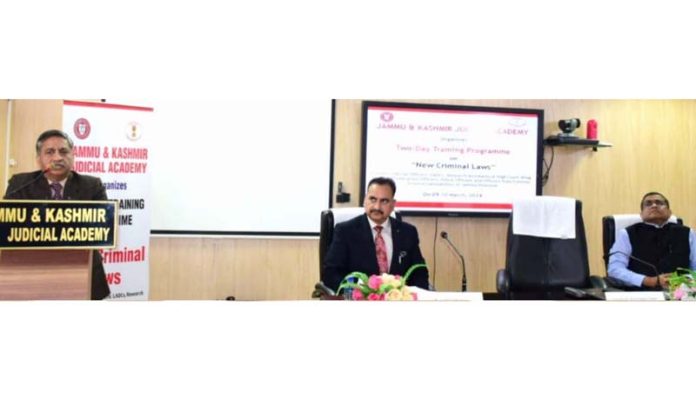Excelsior Correspondent
JAMMU, Mar 9: The J&K Judicial Academy organized a two day training programme on “New Criminal Laws” at J&K Judicial Academy, Janipur, Jammu for Judicial Officers, Prosecution Officers, Police Officers and Officers from Forensic Science Laboratories of Jammu Province including Research Assistants of High Court of J&K and Ladakh at Jammu Wing.
The training programme was inaugurated by Justice Sanjeev Kumar, Judge, High Court of J&K and Ladakh in presence of Sakal Bhushan, an eminent lawyer from Jammu now practising in Supreme Court of India who was also the resource person in the training programme.
Justice Sanjeev Kumar, in his inaugural address, pointed out that earlier Indian Penal Code, as the name itself suggested, was introduced with a view to penalize the Indians. He also gave an overview of the three new laws; Bharatiya Nyaya Sanhita, 2023 (BNS), Bharatiya Sakshya Adhiniyam, 2023 (BSA) and Bharatiya Nagarik Suraksha Sanhita, 2023(BNSS) and highlighted that these new laws are in tune with the spirit of the Constitution and have been introduced in keeping with the aspirations of ‘we the people’.
Elaborating further Justice Kumar said that British-era is punishing and enforcing allegiance to foreign rule whereas, the soul of new laws is Indian and for the first time our criminal justice system will be governed by the laws of India, made by the Indians and for the India. He highlighted that these new laws are not just to punish but to impart justice with equal consideration to the rehabilitation of the victim and provide justice to one and all particularly the marginalized.
Director, J&K Judicial Academy, Y.P. Bourney presented the welcome address and highlighted the core of the programme. He said that Bharatiya Nyaya Sanhita Act, 2023 was presented in the Lok Sabha on August 11, 2023, with the primary goal of overhauling the existing Indian Penal Code, 1860, as well as two other bills aimed at replacing the Code of Criminal Procedure, 1973, and the Indian Evidence Act, 1872.
He emphasised that the Act proposes significant changes, including streamlining certain IPC provisions to reduce its length. It also introduces new offenses such as hate speech and terrorism. Additionally, the Act replaces the sedition with a more stringent offence of treason (Desh Droh or Rashtra Droh). He described that BNS, 2023, not only replaces the old Penal Code but also consolidates legal provisions making the crimes against women and children to be more stringent for better administration of justice.
The working sessions on the first day were chaired by Sakal Bhushan, Advocate, who gave an overview on additions, deletions, modifications and reorganization of chapters and sections under Bharatiya Nagarik Suraksha Sanhita, 2023(BNSS). The learned resource person discussed various newly added provisions and those amended provisions for the benefit of the participants.


